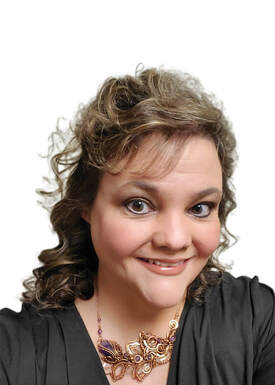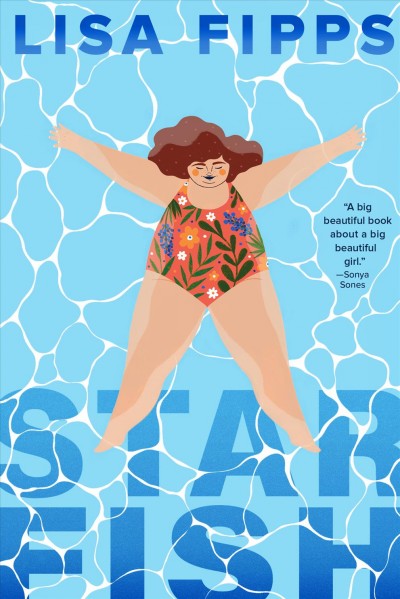| Lisa Fipps is the author of Starfish, a middle-grade realistic fiction novel in verse. It tells the story of Ellie, who has spent years trying to keep people from targeting her because of her weight, but who maybe can learn that she's worthy of respect and love, too. We loved Starfish (it was one of our favorites from 2021), and so we were thrilled to interview Lisa Fipps for this month's feature! Rapunzel Reads: Ellie is a multi-dimensional character who feels real, and who we both quickly fell in love with, and your supporting characters (especially Doc!) are also irresistible. What's your process for creating characters? Lisa Fipps: Characters come to me through what I call movie trailers in my head. A little weird, huh? For example, one movie trailer I had was Ellie swimming in the pool. She was angry. I could tell from how hard her arms slapped the water, how hard she kicked. She swam and swam until she calmed down. Then she floated. I could tell by the look on her face that she was thinking. And then she stretched out her arms and legs — starfished — and her mouth drew up in a smile. Watching that movie trailer made me ask all kinds of questions about her. Why is she angry? What is she thinking about? Why is she stretching out like a starfish? That movie trailer became the poem I’m a Starfish. I don’t get a movie trailer for every poem and I don’t get them in chronological order. Darn it. I get them for the big moments and have to piece together the story. I’d like to get a full-length movie in my head sometime. That’s be sooo helpful! LOL. The closest I’ve come to that is with book two. I saw what I call a mini-movie, showing |
RR: What was your favorite part of writing Starfish? What was the hardest part?
LF: My favorite part of writing Starfish was thinking about it getting in the hands of kids like Ellie, who are bullied for whatever reason, and need to know they’re not alone. Need to know there’s nothing wrong with them but there’s definitely something wrong with people who are cruel to others. Need someone to give them coping tools. Need to know how to stand up for themselves without becoming bullies themselves. And need to realize they have a right to be seen, to be heard, to be noticed, and to take up space. The hardest part of writing Starfish was reliving a lot of painful memories.
RR: Many contemporary middle grade books discuss bullying, but we were struck by the nuance that Starfish brings to it, both concerning who bullies are (they're not limited to mean kids at school) and also how to best respond to it. What was your process for developing that plot thread?
LF: It’s bad enough when a stranger says or does something to bully you, but that’s someone you’re never going to see again. It’s horrible when you are required by law to go to school but then schools all too often don’t acknowledge all the bullying going on, let alone do anything to stop it. It’s a whole other pain and trauma, quite frankly, when you’re a child or teen and have to live with a bully because then there’s no escape. Three things have always baffled me about bullying. One. How anyone who’s been bullied — and knows that excruciating pain — becomes a bully. Two. Fat people bullying other fat people. It’s some unwritten rule that if you’re fat, but not as fat as someone else, you have the right to bully the person who’s fatter than you. That’s just beyond messed up. Third. Family — especially immediate family — bullying you. As a kid, you have every right to expect your family to love and defend you, not hate and attack you. That’s a special kind of cruelty and, quite frankly, abuse. And those three things that baffle me were my reality growing up. They’re reality for lots of people. No one talks about them. And, if they do, they don’t address those issues head-on with brutal honesty. I did. I had to. To not would be inauthentic.
RR: Do you have any tips for an aspiring writer?
LF: Read. Read. Read. Write. Write. Write. I have a dinner plate-sized wooden button next to my desk. It reminds me to keep my butt on the chair and write. Lots of people talk about writing. But talking about writing and dreaming about writing doesn’t make you a writer. Writing does.
RR: What is your favorite thing about being an author?
LF: The writing community and readers, for sure. Other writers get me, understand the struggles of pouring your soul onto page after page day after day. And everyone longs to be understood. All humans long for three things: to be understood, to be loved, and to be accepted unconditionally. I’d write even if I didn’t have readers, though, because writing isn’t just something I do. It’s who I am. I am a writer. It’s as much of my identity as the name Lisa. Maybe even more so.
RR: What books inspired you when you were growing up?
LF: Funny thing. It all started with a simple board book: I Walk to the Park by Marjory Schwalje. It’s about a boy taking his boat to the park. My father died when I was young, so I grew up poor. And my mom was almost 35 before she learned to drive. Between a lack of money and Mom’s fear of driving on interstates, we didn’t go anywhere. That book allowed me to explore New York. Words did that. And I was hooked from that moment on.
Author photo courtesy of Lisa Fipps.





 RSS Feed
RSS Feed
